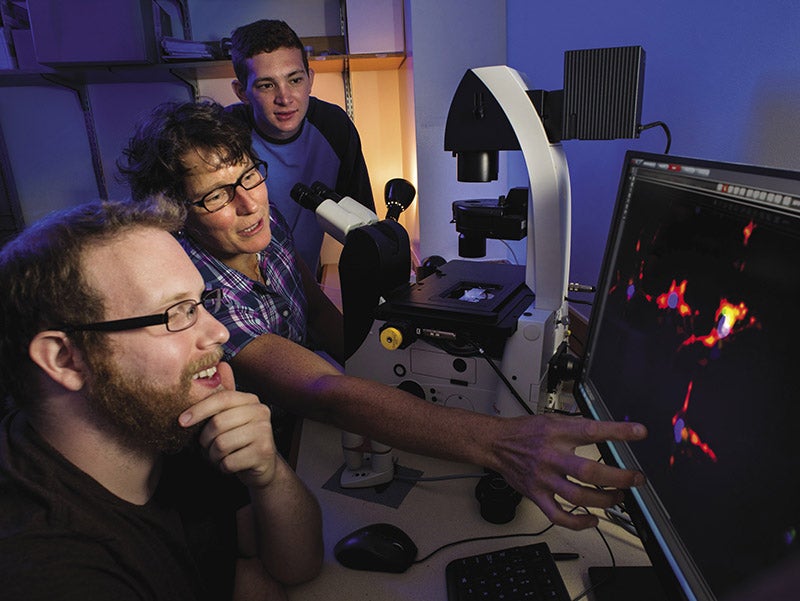
College of Science assistant professor Nadja Spitzer honored with prestigious award for her research and dedication.
According to the National Science Foundation’s website, the Faculty Early Career Development (CAREER) award is the organization’s most prestigious award “in support of junior faculty who exemplify the role of teacher-scholars through outstanding research, excellent education and the integration of education and research within the context of the mission of their organizations.” For anyone who has the opportunity to talk with Dr. Nadja Spitzer, Marshall University College of Science assistant professor of biological science, about her research and teaching, it is no surprise that she was honored with a CAREER award.
The award allows Spitzer to build upon the work she has been doing since she arrived at Marshall in 2007. One example of that work is the Brain Expo. Spitzer and Dr. Brian Antonsen, associate professor of biological science, began the Brain Expo in 2009. Hosted on Marshall’s Huntington campus, the Brain Expo is a “reverse science fair,” where children visit stations that help them learn about how brains work. Children participate in hands-on activities like touching a sheep’s brain, testing their memories and observing how helmets protect the brain from injury. The CAREER award allows Spitzer to take some of the Brain Expo exhibits on the road to area schools throughout the year.
“When you go to the schools, you are reaching many kids at one school in one day, making them aware of brain health,” Spitzer said. “The purpose is not just to teach them about the brain, but to get them excited about science, to show them science is not just a thing you have hard tests on, but it is cool. It is exciting. It is how your body works.”
College of Science undergraduates will do much of the teaching for Herd Science, the name for the traveling version of the Brain Expo, providing the children who participate with role models who are excited about pursuing careers in science. Giving undergraduates opportunities like this to participate in science outside of the classroom is important to Spitzer. One of the aspects of the CAREER award she is happiest about is that it will support undergraduate and graduate students who will work alongside her on her research.
“Students learn about science in their classes, but it can be really abstract,” she said. “Working on actual research in a lab, it all comes to life. All they learned in class is applied. You can see the light bulbs going on. You get to teach them to do things like design and run their own experiments and projects. We go to international conferences and present. For them to get a taste of that broadens their horizons a lot.”
Senior Ana Garcia Ramirez, who has worked in Spitzer’s lab since her freshman year, said the experience she has gotten laid the foundation for her career.
“Working in the lab has already benefited me so much in my upper-level biology classes, and I think it will help me in my career as a physician as well, because I will have the work ethic and experience of working in a scientific setting. Dr. Spitzer isn’t just a principal investigator, but a mentor who is so dedicated to her students, especially us who work in the lab,” Garcia Ramirez said.
Graduate student Robert Cooper has worked in Spitzer’s lab for four years, two as an undergraduate and two as a graduate. He said working with Spitzer has helped him learn that even failure is a valuable part of the scientific process.
“What no one ever tells you when you first walk in a lab is that most of science is failure: experiments go bad, statistics don’t show any significant trends in the data, or you accidentally mess up pretty badly and the results you get aren’t usable. What’s great about Dr. Spitzer is that she’s willing to sit down with us and show us what we did wrong, calmly, patiently. After that, she’ll help us get ourselves back up and figure out a new approach we hadn’t thought of before,” Cooper said.
Spitzer’s research focuses on silver nanoparticles. Silver has long been valued for its antimicrobial properties, but only recently have silver nanoparticles been used in consumer products, like odor-resistant socks, household appliances and children’s toys. These nanoparticles, while not considered toxic, can bypass the body’s defense systems and be absorbed into tissues, including brain tissue, where they remain and build up over time. Little is known about the long-term effects of that build-up.
“In my lab we are looking at environmental contaminants, things that are in the environment that consumers are exposed to, not at a toxic level or dangerous levels, but at low levels, and how they affect brain cells,” Spitzer said. “The contaminants are doing something. I am interested in what that something is.”
Spitzer acknowledged that the CAREER award is a tremendous honor, but she is quick to point out that she is one of many faculty in the College of Science who are making valuable scientific and educational contributions.
“I am not unique here. We have lots of faculty who do the same thing I do and are just as dedicated to working with students in their labs and acting as mentors to students,” she said. “I am certainly not the first Marshall faculty member to get an NSF grant. There are a lot of scientists here doing top-notch, competitive, world-class research, with undergraduates and master’s students. Those students are getting an experience that will help them succeed at whatever they do next. We can always use support to help us continue that work.”
Molly McClennen is a freelance writer who divides her time between Huntington and Chicago, where she attends graduate school at the University of Illinois.
Photo: Spitzer said a major benefit of the CAREER award is how it will support the students who work alongside her in her research.